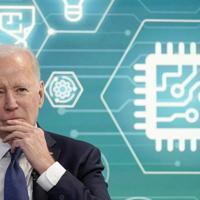US’ new restrictions on AI chip exports raise concern

The AI Chip Export Tightrope: Balancing Innovation and Security
China's Ire: "Flagrant Violation"
Washington's latest export restrictions on AI chips have sparked outrage in Beijing, with the Commerce Ministry condemning it as a "flagrant violation" of international trade norms.
EU's Concerns: "Deep Disappointment"
The European Union has expressed its "concern" over the new measures, highlighting Europe's importance as a non-security risk partner.
Protecting the AI Lead
"The U.S. leads the world in AI," declared Commerce Secretary Gina Raimondo. "It's critical that we keep it that way."
New Export Controls
The rules require authorization for exports, re-exports, and in-country transfers of chips, with exceptions for friendly countries.
Enhanced Security for AI Data Centers
AI data centers must now meet stricter security guidelines to qualify for chip imports.
Stricter AI Model Sharing
Sharing advanced AI models is also subject to tighter regulations.
Industry Backlash
"We're deeply disappointed," said John Neuffer, CEO of the Semiconductor Industry Association. "These rules will harm U.S. competitiveness."
Nvidia echoed these concerns, stating, "These rules would do nothing to enhance U.S. security."
OpenAI's Perspective
In a white paper, OpenAI advocates for government support in the AI industry and the "responsible exporting" of cutting-edge models to allies.
Window of Opportunity
The new rules will take effect in 120 days, providing an opportunity for the incoming Biden administration to potentially review them.
Balance between Innovation and Security
The Computer & Communications Industry Association warns that the rule could hinder the deployment of advanced semiconductors abroad.
Nvidia emphasizes the importance of innovation and global collaboration, citing the success of the Trump administration's policies.